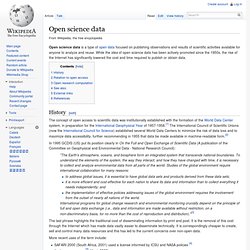

Society & values. Open Data Study. Substantial social and economic gains can be made from opening government data to the public.

The combination of geographic, budget, demographic, services, education, and other data, publicly available in an open format on the web, promises to improve services as well as create future economic growth. This approach has been recently pioneered by governments in the United States and the United Kingdom (with the launch of two web portals, www.data.gov and www.data.gov.uk respectively) inspired in part by applications developed by grassroots civil society organizations ranging from bicycle accidents maps to sites breaking down how and where tax money is spent.
In the UK, the data.gov.uk initiative was spearheaded by Tim Berners-Lee, the inventor of the World Wide Web. Legal. Licensing_Open_Data_A_Practical_Guide.pdf. Economic and political. Where Does My Money Go. Welcome - OpenSpending. Science and technology policy. OECD Home › Science and technology › Science and technology policy › Science, Technology and Innovation for the 21st Century.

Meeting of the OECD Committee for Scientific and Technological Policy at Ministerial Level, 29-30 January 2004 - Final Communique 1. The OECD Committee for Scientific and Technological Policy met at Ministerial level on 29 30 January 2004. Mr. Peter McGauran, Minister for Science of Australia, chaired the meeting, with Ms. Environment. Earth Observations from Space: The First 50 Years of Scientific Achievements. The following HTML text is provided to enhance online readability.

Many aspects of typography translate only awkwardly to HTML. Please use the page image as the authoritative form to ensure accuracy. Earth observations from space demonstrate the successful synergy between science and technology. As scientists have gained experience in studying Earth through satellite observations, they have defined new technological needs, helped drive technological development to provide more quantitative and accurate measurements, and have advanced more sophisticated methods to interpret satellite data.
To capitalize fully on the investment made in Earth-orbiting observing platforms and make the best use of these observations, satellite data require careful calibration and sophisticated analysis and assimilation tools. Based on its review of important scientific accomplishments, the committee concludes the following (for a detailed description, see Chapter 12 ): Science & technology. Open science data. Open science data is a type of open data focused on publishing observations and results of scientific activities available for anyone to analyze and reuse.

While the idea of open science data has been actively promoted since the 1950s, the rise of the Internet has significantly lowered the cost and time required to publish or obtain data. History[edit] The concept of open access to scientific data was institutionally established with the formation of the World Data Center system, in preparation for the International Geophysical Year of 1957-1958.[1] The International Council of Scientific Unions (now the International Council for Science) established several World Data Centers to minimize the risk of data loss and to maximize data accessibility, further recommending in 1955 that data be made available in machine-readable form.[2] "The Earth's atmosphere, oceans, and biosphere form an integrated system that transcends national boundaries.
More recent uses of the term include: Open data brief. Gapminder: Unveiling the beauty of statistics for a fact based world view. Information Is Beautiful. Data.gov.uk. Open Knowledge Foundation. Knowledge for everyone.